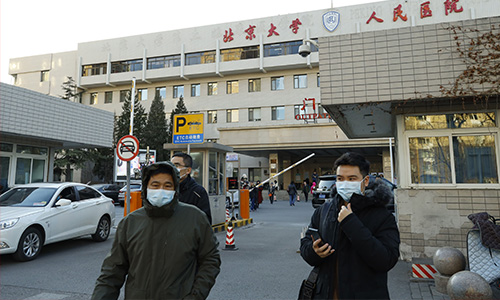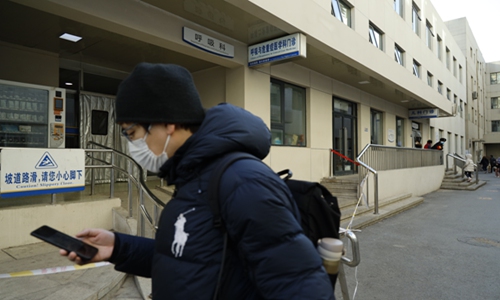HOME >> CHINA,SPECIAL-COVERAGE
China stays alert on spreading pneumonia
By GT staffers Source:Global Times Published: 2020/1/20 23:03:40
Preventative measures, information disclosure to be further enhanced

People wearing masks walk in front of the gate of the Peking University People's Hospital in Beijing on Monday. Photo: Li Hao/GT
The number of confirmed cases of new coronavirus-related pneumonia-like disease has risen to 217 in Chinese mainland including 198 in Wuhan, capital of Central China's Hubei Province and five in Beijing as of Monday evening. President Xi Jinping urging the effective control of the epidemic outbreak and said that the safety and health of the people should come first.According to the Chinese national broadcaster Central China Television (CCTV) on Monday, Xi also instructed that all relevant parties should work in concert and take effective measures to resolutely contain the spread of the new virus-related disease.
There are also 7 suspected virus-related cases including two in Southwest China's Sichuan Province and two in Shanghai, CCTV reported.
As the number of new cases grew in recent days, the scope of infection has also expanded, which attracted much more public attention. However, there were no signs of public panic, while analysts warned that the source of the coronavirus has not yet been verified and government agencies should stay alert, suggesting more timely information disclosure and work hard on preventative measures.
Global Times reporters visited hospital emergency wards in Beijing and Shanghai Monday morning where they uncovered no long lines of patients seeking treatment for fever, but noted staff nonetheless were on alert for visitors exhibiting the relevant symptoms.
"Patients whose body temperature is over 37.3 need to be checked for the common flu, as it is peak flu season," a nurse at Beijing Chaoyang Hospital told the Global Times on Monday. The hospital is forwarding detailed patient information to authorities as requested.
Global Times reporters saw no indication of public panic, and the hospital appeared to be operating normally. Over the last month, there had been a growing number of patients with the common flu, but "not the coronavirus," the nurse said.
"There's no need to overreact," she said.

A person wearing mask walks in Clinic of Respiratory and Critical Care Medicine of the Peking University People's Hospital in Beijing on Monday. Photo: Li Hao/GT
China has adopted strict preventative plans and made great efforts to treat patients, besides closely monitoring the situation," said Geng Shuang, Ministry of Foreign Affairs spokesperson, at a routine press conference on Monday.Authorities were dealing with the outbreak "with the utmost seriousness and professionalism," Geng noted.
To prevent the virus spreading farther, Wuhan has adopted measures for those who leave the city and China will continue its close communication with other countries and regions, Geng said.
Coronavirus cases have been reported in regions and countries such as China's Hong Kong Special Administrative Region, Thailand, Japan and South Korea.
Chinese officials and experts repeatedly emphasized that the virus has a low risk of human-to-human transmission, a low death rate and that China has improved its infectious disease research, surveillance and diagnosis capabilities since the SARS outbreak in 2002-03.
Cities on alert
Although China has made major breakthroughs in responding to infectious diseases since the outbreak of SARS, analysts said it should stay cautious as the cause of the virus has not been identified while major cities have stepped up control measures.
Wuhan has set up body temperature sensors and temperature checkpoints at railways, train stations and airport. Those who leave Wuhan with a fever need to be registered and receive medical services. Public transportation vehicles have been put under daily disinfection, according to Wuhan media reports.
Beijing has strengthened internal medical communication, checks and training of medical staff, according to the capital city's health commission.
Wang Yuedan, a professor of the department with the department of immunology at Peking University, told the Global Times on Monday that it was "very likely" the number of confirmed cases would rise, but the risk of a SARS-style outbreak was "very low."
Zeng Guang, former chief epidemiologist of the Chinese Center for Disease Control and Prevention, told the Global Times on Monday that Novel coronavirus-related pneumonia does not have as high a death rate as SARS and there was no "super spreader" to infect so many people.
"We identified the new virus in a very short time, which illustrates our improved overall ability," Zeng said.
"We found the new coronavirus independently in about 10 days, but during the SARS epidemic crisis, it was foreign experts who found the virus after around three months."
China has established a system for the early detection of 300 known pathogens and the screening, identification and detection of unknown pathogens, according to the Ministry of Science and Technology.
The country has also set up the world's largest network of laboratories for pathogen spectrum monitoring of infectious disease symptoms, the ministry said.
This includes 12 core labs, 91 provincial-level key labs and about 800 hospital labs focusing on detecting the cause of illnesses of the respiratory tract, diarrhea, fever with a rash, fever and bleeding and encephalitis meningitis, the ministry said in a statement on its website on Monday.
More time was needed to figure out the source of the coronavirus, Chinese analysts said.
"The outbreak was initially detected in a seafood market, but was localized. There have not been many outbreaks in seafood and poultry markets, making it difficult to indentify common characteristics," Yang Zhanqiu, a professor with the Pathogen Biology Department at Wuhan University, told the Global Times on Monday.
Meanwhile, the signs have emerged as the possibility of "human-to-human transmission has not been ruled out by Wuhan or national health authorities and so the Spring Festival travel rush would likely increase the chances of transmission, experts warned.
The pneumonia can be "transmitted through human-to-human contact," Zhong Nanshan, a predominant Chinese pulmonologist and the lead scientist who helped China battle SARS in 2003, was quoted as saying in a CCTV report on Monday.
RELATED ARTICLES:
Posted in: SOCIETY,FOCUS